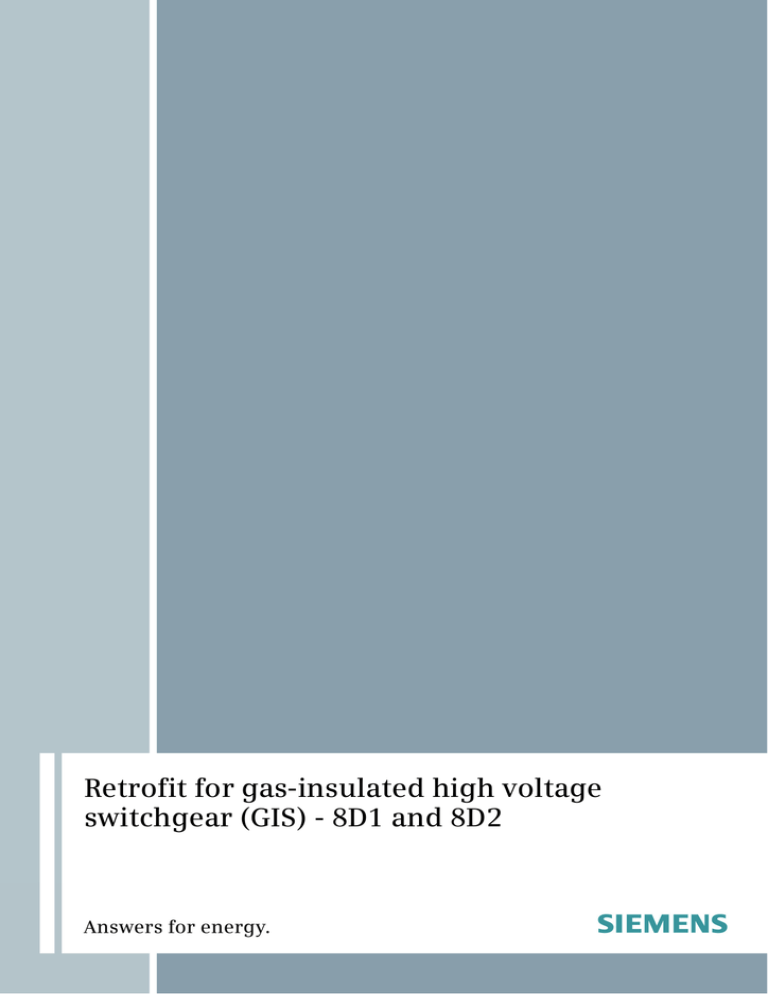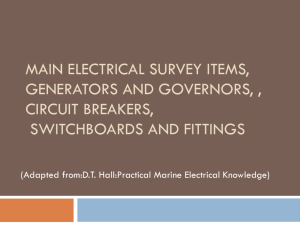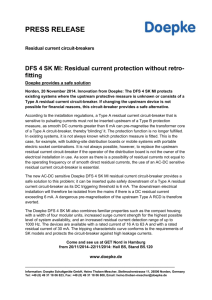
Retrofit for gas-insulated high voltage
switchgear (GIS) - 8D1 and 8D2
Table of Contents
1
Introduction .............................................................................................................. 4
2
Description of retrofit circuit-breaker 8DN8 ................................................................ 5
3
Technical data for retrofit circuit-breaker 8DN8 .......................................................... 6
4
Adapter - retrofitting circuit-breaker 8DN8 - existing switchgear ................................. 7
5
Retrofitting steps ..................................................................................................... 12
6
Circuit-breaker maintenance comparison old vs. new ............................................... 19
7
Time schedule for retrofit solution............................................................................ 21
8
Scope of delivery ..................................................................................................... 21
9
Life time expectation of existing GIS without new circuit-breaker.............................. 21
10
Type tests ................................................................................................................ 21
11
Options ................................................................................................................... 22
Page 2 of 23
List of Figures
Fig. 1: Existing substation with 8D2 double-pressure circuit-breaker ............................................... 4
Fig. 2: Main dimensions of retrofit circuit-breaker 8DN8 ................................................................. 5
Fig. 3: 8D2 bay with old blast piston circuit-breaker........................................................................ 7
Fig. 4: 8D2 bay with 8DN8 circuit-breaker ...................................................................................... 8
Fig. 5: 8DN8-circuit-breaker with two adapters equipped with gas-tight bushings towards the GIS
section ............................................................................................................................... 9
Fig. 6: Side view of the 8DN8 circuit-breaker with two adapters...................................................... 9
Fig. 7: Top view of 8DN8-circuit-breaker with two adapters .......................................................... 10
Fig. 8: Top view of contact arrangement ...................................................................................... 11
Fig. 9: Side view of an 8D switchgear with doublel-pressure circuit-breaker .................................. 12
Fig. 10: Electrical view ................................................................................................................. 12
Fig. 11: SF6 pressure view ............................................................................................................ 13
Fig. 12: Third retrofitting step (a)................................................................................................. 14
Fig. 13: Third retrofitting step (b)................................................................................................. 14
Fig. 14: Fourth retrofitting step (a)............................................................................................... 15
Fig. 15: Fourth retrofitting step (b) .............................................................................................. 15
Fig. 16: Fifth retrofitting step (a).................................................................................................. 16
Fig. 17: Fifth retrofitting step (b).................................................................................................. 17
Fig. 18: Sixth retrofitting step: Bay after retrofitting ..................................................................... 18
Fig. 19: Standardized maintenance costs ..................................................................................... 20
List of Tables
Tab. 1: Technical data for circuit-breaker 8DN8 .............................................................................. 6
Tab. 2: Technical data of the adapter ............................................................................................. 7
Tab. 3: Comparison SF6 content old/new ........................................................................................ 8
Tab. 4: Comparison of the maintenance intervals of the different circuit-breakers......................... 19
Page 3 of 23
1
Introduction
The first SF6-gas insulated switchgear of type 8D1 and 8D2 delivered by Siemens are now 40 years
and older. These substations have proved outstanding in operation. They are rugged, reliable, and
virtually leak-free (SF6 or oil) and still fulfill their function perfectly.
Today, stricter and more economically focused standards apply with respect to the maintenance of
gas-insulated switchgear. Especially the SF6 – double -pressure circuit-breakers used since GIS
systems were first introduced on the market are highly maintenance-intensive. However, since the
other GIS components (excluding the original circuit-breaker) require very little maintenance and
have an expected life span of over 50 years provided the Siemens maintenance recommendations
described in the operating manual are followed, Siemens offers a retrofit solution. This is in the
form of a state-of-the-art SF6-circuit-breaker with spring mechanism based on more than 40 years
of accumulated experience and intensive research.
Fig. 1: Existing substation with 8D2 double-pressure circuit-breaker
Page 4 of 23
2
Description of retrofit circuit-breaker 8DN8
The circuit-breaker employed in this retrofit solution is used in the current GIS and HIS substations
8DN8 up to 145 kV and also in 123 kV and 145 kV outdoor circuit-breakers. This type-tested breaker
has proven itself in service over the years in thousands of applications. The most important
advantages of this self-compression circuit-breaker of the latest generation are:
Significantly lower maintenance costs (see chapter 6)
Type-tested to the latest IEC standard (at the time of the development)
State-of–the-art spring mechanism with extremely low maintenance
Fig. 2: Main dimensions of retrofit circuit-breaker 8DN8
Page 5 of 23
3
Technical data for retrofit circuit-breaker 8DN8
Standard
Rated voltage
Rated frequency
Rated short-time power-frequency withstand
voltage
Rated lightning impulse withstand voltage
Rated normal current
Rated short-circuit-breaking current
Rated short-time withstand current
Rated duration of short-circuit
Rated peak withstand current
First-pole-to-clear-factor
SF6 filling pressure at 20 °C
Loss of SF6
General lockout SF6
Volume of SF6 gas:
Break time
Opening time
Arcing time (50 Hz)
Closing time
Operating sequence (IEC)
Motor spring operating mechanism
Auto reclosing
Closing coil
Tripping coil
Auxiliary switch
Weight of circuit-breaker without SF6 gas:
IEC, latest edition (at the time of the
development)
123 – 145 kV
50/60 Hz
230 – 275 kV
550 – 650 kV
3150 A
40 kA
40 kA
</= 3 s
100 kA
1.5
0.56 MPa
0.52 MPa
0.50 MPa
35kg
60 ms
32 +/- 3 ms
24 ms
55 +/- 6 ms
CO-15s-CO or O-0.3s-CO-3min-CO
220 V DC / 3.0 A / 10 A
230 V AC / 8.0 A / 20 A
3-pole
225 W at 220 V DC
225 W at 220 V DC
8 NO/8 NC/1 WI; 250 V / 2.5 A
900 kg
Tab. 1: Technical data for circuit-breaker 8DN8
Replaces: Circuit- breaker for 8D1 and 8D2 up to 145 kV, double-pressure type and blast piston
type
Page 6 of 23
4
Adapter – retrofitting circuit-breaker 8DN8 – existing
switchgear
The adapter, two of which are needed for connecting the new circuit-breaker to the existing
switchgear, is type-tested with 650 kV rated lightning impulse withstand voltage and connects the
three-phase encapsulated circuit-breaker with the single-phase encapsulated switchgear.
The adapter forms a single SF6-gas compartment with joint gas monitoring together with the
circuit-breaker. It is connected to the existing GIS switchgear through gas-tight bushings.
Rated lightning impulse withstand voltage:
Weight of an adapter:
SF6 filling pressure at 20°C:
Volume of SF6 gas/adapter:
650 kV
approx. 200 kg
0.56 MPa
18.75 kg
Tab. 2: Technical data of the adapter
Fig. 3: 8D2 bay with old blast piston circuit-breaker
Page 7 of 23
Retrofit 8DN8 selfcompression circuitbreaker 123 kV
Circuit-breaker
35 kg
Adapter
2 x 18.75 kg
Total volume SF6 gas
72.5 kg
Tab. 3: Comparison SF6 content old/new
8D1/2 double pressure
circuit-breaker
123 kV
8D2 blast piston circuitbreaker 123/145 kV
105 kg
87 kg
Fig. 4: 8D2 bay with 8DN8 circuit-breaker
Page 8 of 23
Fig. 5: 8DN8-circuit-breaker with two adapters equipped with gas-tight bushings towards the GIS section
Fig. 6: Side view of the 8DN8 circuit-breaker with two adapters
Page 9 of 23
Fig. 3 shows the original system with 8D2 blast piston circuit-breaker. In Fig. 4, the circuit-breaker is
replaced by an 8DN8 circuit-breaker. The connection between the 3-phase encapsulated 8DN8
circuit-breaker and the remaining single-phase 8D2 encapsulated GIS section is implemented via
two adapters as shown in perspective in Fig. 5. Fig. 6 shows a side view from left to right:
Upper and lower adapter - transition from single-phase encapsulation to 3-phase
encapsulation
3-phase encapsulated 8DN8 circuit-breaker
Fig. 7: Top view of 8DN8-circuit-breaker with two adapters
Fig. 7 shows the top view of the three-pole encapsulated 8DN8 circuit-breaker with indicated
contact arrangement connected to the single-pole encapsulated adapters.
Page 10 of 23
Fig. 8: Top view of contact arrangement
Fig. 8 shows the contact arrangement of the adapter.
Page 11 of 23
5
Retrofitting steps
Fig. 9: Side view of an 8D switchgear with doublel-pressure circuit-breaker
Fig. 9 shows the typical design of a 8D bay with doublel-pressure circuit-breaker
Fig. 10: Electrical view
Legend: red= voltage, green: no voltage
Page 12 of 23
Fig. 11: SF6 pressure view
Legend: blue= air at atmospheric pressure; yellow= SF6 at rated pressure
Views 10 and 11 show the second step of the retrofit
1) Switch off circuit -breaker -Q0
2) Switch off disconnectors -Q1, -Q2 and -Q8
3) Switch on and secure earthing switches -Q51 and -Q52
4) Switch off and earth the cable from the remote end
5) Switch off the auxiliary and tripping circuits
6) Perform gas work in accordance with diagram
7) Disassemble old circuit-breaker -Q0 with accessories
8) Check the existing 8D2 bushings and contacts
9) Install the new circuit-breaker with preassembled adapters
10) Install the new circuit-breaker module
11) Evacuate the new circuit-breaker module
12) Modify or replace the VOS (local control cubicle)
13) Top up SF6 to rated pressure
14) Commission the new circuit-breaker
15) Switch on the auxiliary and tripping circuits
16) Switch off the earthing switches -Q51, -Q52 and -Q8 and the earthing switch at the remote
end of the cable.
17) Switch on disconnectors -Q1, -Q2 and -Q8
18) Switch on circuit-breaker -Q0
19) Bay is energized
Figs. 12-18 show the individual steps of the retrofit graphically
Page 13 of 23
Fig. 12: Third retrofitting step (a)
Fig. 13: Third retrofitting step (b)
Page 14 of 23
SF6-Gas Scheme
1,5 to
-T5
-Q52
-Q8
-Q9
-Q0
-Q51
-Q2
BB II
-Q1
-Z1
BB I
Fig. 14: Fourth retrofitting step (a)
Fig. 15: Fourth retrofitting step (b)
Page 15 of 23
Fig. 16: Fifth retrofitting step (a)
Page 16 of 23
Fig. 17: Fifth retrofitting step (b)
Page 17 of 23
4000
1,5
to
-T5
-Q8
5335
-Q52
-Q9
4050
-Q0
-Q2
-Q1
-Z1
1335
3000
-Q51
BB II
1792
1115
BB I
1245
940
Fig. 18: Sixth retrofitting step: Bay after retrofitting
Page 18 of 23
6
Circuit-breaker maintenance comparison old vs. new
Minor
inspection (or
enhanced
visual
inspection)
8D1/2
Double -pressure circuitbreaker
8D2
Blast piston circuit-breaker
8DN8
Self compression circuit-breaker
1000 x CO in rated nominal
current range or after 5 years
3000 x CO in rated nominal
current range or after 10 years
3000 x CO in rated nominal current
range or after 17 years
Taking out of service
necessary
Taking out of service
necessary
Taking out of service not necessary
5000 x CO in rated nominal
current range or after 10
years
6000 x CO in rated nominal
current range or after 20 years
6000 x CO in rated nominal current
range or after 25 years
Taking out of service
necessary
Taking out of service
necessary
Taking out of service necessary
Replacement of blast valve
Major
Inspection
(or standard
inspection)
Replacement of blast valve
Tab. 4 Comparison of the maintenance intervals of the different circuit-breakers
Table 4 compares the maintenance intervals of the individual circuit-breaker types over a period of
25 years. It can be plainly seen that the maintenance expenditure as well as the short maintenance
intervals for double-pressure circuit-breaker are no longer economical compared with the new
8DN8-circuit-breaker and no longer in keeping with today’s needs.
Fig. 19 shows the standardized maintenance costs (at today’s costs) of the different circuit-breaker
types over a 25-year operating period which naturally does not represent the whole life span of the
new 8DN8 circuit-breaker. Compared to the new 8DN8-circuit-breaker the maintenance costs for
the 8D1 double-pressure circuit-breaker are about 15 times higher, and the costs for the 8D2- blast
piston circuit-breaker still 3 times as high.
Page 19 of 23
Fig. 19: Standardized maintenance costs
-
blue: Double-pressure circuit-breaker 8D1/8D2
red: Blast piston circuit-breaker 8D2
yellow: Self compression circuit-breaker 8DN8
Page 20 of 23
7
Time schedule for retrofit solution
The total duration from the receipt of the order to the provisional acceptance test is approximately
9 months referred to 1 bay. The actual retrofit, for example the dismantling of the existing circuitbreaker, installation of the new circuit-breaker, start-up and high voltage testing takes
approximately 4 weeks.
8
Scope of delivery
The scope of delivery comprises:
9
Circuit-breaker 8DN8, 3-phase encapsulated, including supporting structure
SF6 gas (2 x 40 kg bottles to ensure problem-free conversion); SF6 gas from the old 8D1/2
breaker is reused)
2 adapters – from 3-phase encapsulated circuit-breaker to single-phase switchgear
Small parts such as sealing material, filter material, etc.
Control cubicle adaptation components or complete new control cubicle
Life time expectation of existing GIS without new
circuit-breaker
A life expectancy > 50 years is predicted for the remaining GIS components, provided that the
Siemens maintenance recommendations have been followed as described in the operating manual.
Tests on the gastight insulators of an over 40-year old 8D2 GIS did not show any discrepancies. The
insulators did not produce any partial discharges. Naturally, if desired, a retrofit can be carried out
on the existing disconnector and earthing switches. These devices can then be equipped with the
latest motor drives.
10
Type tests
Type tests are available for the retrofit 8DN8-circuit-breaker.
Page 21 of 23
11
Options
Local control cubicle, including control cable
Service measures on the bays in conjunction with the planned retrofit
Retrofitting of the disconnector / earthing switch drives with the latest generation of drives
Overhaul of the dismantled 8D1/8D2 circuit-breaker
Decentralized SF6 gas monitoring
Replacement of old cast-resin voltage transformer with SF6-insulated transformer
UHF antennas
Page 22 of 23
Published by and copyright © 2011:
Siemens AG
Energy Sector
Freyeslebenstrasse 1
91058 Erlangen, Germany
Siemens AG
Energy Sector
Power Distribution Division
Transmission and Distribution Services
Humboldtstrasse 59
90459 Nuremberg, Germany
For more information, please contact
our Customer Support Center.
Phone: +49 180/524 70 00
Fax:
+49 180/524 24 71
(Charges depending on provider)
E-mail: support.energy@siemens.com
Power Distribution Division
Transmission and Distribution Services
Order No. SE_AS_1010e_W3233-8D1D2Retrofit
Printed in Germany
Printed on elementary chlorine-free bleached paper.
All rights reserved.
Trademarks mentioned in this document
are the property of Siemens AG, its affiliates,
or their respective owners.
Subject to change without prior notice.
The information in this document contains
general descriptions of the technical options
available, which may not apply in all cases.
The required technical options should therefore
be specified in the contract.
Page 23 of 23





